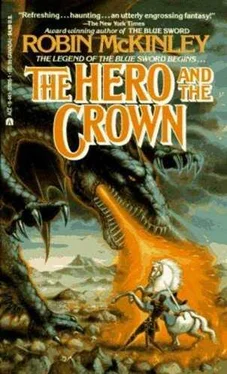He carried her into the stone hall, and she leaned her head against his chest, and thought of nothing. His boots were soft-soled and his footsteps silent; but the rustle of her breathing echoed through the hall like the wings of a flock of small birds. He set her in a high-backed chair at the far end of the hall, and picked up a goblet from a small table, glared at it, muttered over it, said, “This will have to do,” and gave it to her. She held it, dreamily, but even with both hands around it, it swayed and began to sag, and the man, with a muffled exclamation, leaned over her and grasped the stem of the goblet around her two hands. His hand was warm, like Talat’s mane, and the goblet was cool. “Who are you?” she asked, looking into the frowning face bending over her.
“I am Luthe,” he said. “Drink.”
She took the first sip, obediently, as she had drunk Teka’s draughts when she was young and had fevers. She did not remember a second sip.
She awoke, pressed down with blankets, in a narrow curtain-less bed. The bed was one of many, set side by side down a long narrow corridor; the heads were pushed up against one wall where slit windows high above shed sunlight on their feet; and beyond the beds was a narrow passage and then the far wall, taller than the window wall, the roof slanting up sharply from the one to the other. She blinked drowsily at the far wall; it was blank grey stone, like the rest of Luthe’s hall. Or not blank: Aerin sat up, shedding blankets, and frowned; etched into the grey stone were faint relief pictures, but she could not quite decide what they depicted: men with antlers, women with wings, trees with eyes that watched. She blinked again; her vision hadn’t been trustworthy in a long time.
Her fever was gone. She felt as weak as when she had first dragged herself to the stream after Maur’s death, but she felt happy, with a senseless transparent happiness like that of a very young child. She wrestled cheerfully with the enshrouding blankets, got feebly to her feet, and began to make her way down the row of beds by clinging to the foot of each in turn—all of them empty, and all but hers neatly made up with coarse dark blankets, and pillows wrapped in smooth dark cloth. She came to an arch of doorway and looked through; the thickness of the wall it pierced made the entrance dark, but beyond it the great hall was bright with daylight. There were windows cut high into the two lengthwise walls of the great chamber, the walls themselves high enough that the windows looked out over the roofs of the sleeping corridors; and yet far above them all the ceiling was invisible in darkness.
Luthe saw her and frowned. “You should have slept longer.”
“No, I shouldn’t. I have slept just the right amount; I feel dazzlingly”—she ran out of breath, and leaned against the threshold—“hungry. I haven’t felt hungry in a long time.”
“I will claim that as my consolation; but evidently I still have not learned to get simple sleeping draughts right. Lily would be ashamed of me. Come eat, then.” He watched her drift toward him; it seemed to be a long way from the sleeping-chamber door to the table before the hearth, where he was. His hands closed over the high back of the chair he stood behind as he watched her, but he did not offer to help her. She fetched up against the table at last; it was a small delicate table, but she was little more than a wraith, and when she flattened both hands on the top of it to steady herself it held her slight weight easily.
She looked up at him and smiled: a lover’s smile, sweet and brilliant, but it was not directed at him; her eyes looked at something invisible that she herself did not recognize, and yet his heart stirred in a way he did not like. He returned her smile with a deeper frown, and she chuckled—a little tapping sound, like mouse feet on a stone floor. “I am not blind, sir, though I do seem to see light where there is only darkness and strange pictures on a blank wall; and I am quite sure that I see you scowling furiously at me, like a tutor at a student who persists in misbehaving. Pray tell me what I have done.”
“You have waited too long to come here.”
Her smile ebbed away. “I have not been thinking clearly for long ... I had so many strange dreams.” She thought of Maur’s head speaking to her from a wall in her father’s castle, and a spasm crossed her face, and she raised one hand from the table to cover it., “It was easy,” she said through her fingers, “not to believe there was any use in them.”
There was silence between them; Aerin stirred, and dropped her hand, but her face was still sad. “Talat?” she asked.
“ ... is eating his head off in a meadow among my cattle. You need have no fear for him.”
“I have none.” Abruptly she asked: “Am I dying?”
“Yes.”
“Can you cure me?”
Luthe sighed. “I’m not sure. I think so. Had not ...”
“Had I not listened to Maur’s head, I would have come here long since,” Aerin said dreamily. “Had it not told me that I could not win against the Black Dragon, for no one could, I might have believed that there was enough left of my life to be worth healing; but I am Dragon-Killer, the least of my family, and if I have done a great thing, then I must die of it.” Her words floated on the air, half visible, like spider silk.
“You are not the least of your family,” Luthe said violently; “your mother was worth seven of her husband, and you’ve the courage she had, or she’d not have borne you, and you would not be standing here now after what Maur has done to you—and does to you yet.”
Aerin stared at him. “Does to me yet? ... They hung its skull in the great hall, and it spoke to me. I was stronger for a while, till I saw it there, and it spoke to me.”
“Spoke—? How could anyone, even a hundred generations later, be so stupid as to bring back the Black Dragon’s head as a trophy and hang it on a wall for folk to gape at? Surely—”
“I asked them to take it away—where no one might look at it again.”
Luthe paced twice around the table before he said anything. “Dragon-Killer indeed. They do not know how lucky they are to have had you. To have had you at all. And I am fool enough to want to give you back to them.”
Witchwoman’s daughter, Aerin thought. But I told Tor I would come back if I could.
Luthe sat wearily down. “I have sat up here too long; it is so pleasant, not meddling. Perhaps after a hundred generations it is possible to forget.”
“You knew my mother?”
“Yes.”
It was not an answer, nor a tone of voice, to encourage further questions. She looked down, and noticed that there was bread and fruit on the table she leaned on, and she picked up a handful of cora berries and began to eat them one at a time.
“She was like you, but smaller,” Luthe said after she finished the last berry and had begun on a piece of bread. “The burden she carried was different from yours, and it had worn on her for many years. When I knew her she had forgotten joy, although I believe Arlbeth gave her a little back again.”
Aerin’s low rough voice seemed to come from the high grey walls and not from the thin figure bowed over the table before him: “It is said in the City that she died of despair when she found she had had a daughter and not a son.”
“It is probably true,” Luthe said, his voice level. “She had courage enough, but little imagination; or she would not have forgotten joy, whatever the weight on her, and heavy enough it truly was.”
“Is it a weight a son might have lifted from her?”
“It is a weight any of her blood and courage may lift. Damn you,” he said, his voice rising. “Couldn’t you tell the difference between a true dream and dragon poison?”
Читать дальше












